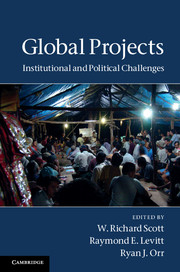Book contents
- Frontmatter
- Contents
- List of figures
- List of tables
- List of contributors
- Preface
- Introduction: studying global projects
- Part I Foundational themes
- 1 Global projects: distinguishing features, drivers, and challenges
- 2 The institutional environment of global projects
- 3 Social movements and the growth in opposition to global projects
- Part II Institutional differences and global projects: empirical studies
- Part III Political conflicts and global projects
- Part IV Governance strategies and structures
- References
- Index
2 - The institutional environment of global projects
Published online by Cambridge University Press: 05 June 2012
- Frontmatter
- Contents
- List of figures
- List of tables
- List of contributors
- Preface
- Introduction: studying global projects
- Part I Foundational themes
- 1 Global projects: distinguishing features, drivers, and challenges
- 2 The institutional environment of global projects
- 3 Social movements and the growth in opposition to global projects
- Part II Institutional differences and global projects: empirical studies
- Part III Political conflicts and global projects
- Part IV Governance strategies and structures
- References
- Index
Summary
Since the 1960s, students of organizations have increasingly recognized the extent to which organizations are creatures of their context – social actors affected by and, simultaneously, shaping the environments within which they operate. Beginning with the insights of “general” or “open” system theorists (Bertalanffy 1956; Katz and Kahn 1966), organizational scholars have labored to:
extend the levels of analysis employed – from approaches focusing on individual behavior within organizations that treated the organization as context, to viewing organizations themselves as collective actors, to examining organizations as components of wider systems, whether organizational populations or organization fields; and to
expand the facets of environment considered – from technical and resource-based exchanges, to political processes, to involvement in relational systems, to institutional forces (Scott and Davis2007: chap. 5).
Studies of systems of organizations operating in diverse institutional environments are, hence, in the forefront of the most recent phase of organization studies. To exemplify and explore this dual focus, it is difficult to conceive of a better object of empirical analysis than that presented by global infrastructure construction projects, which involve the temporary collaboration of multiple independent organizations, operating under diverse regulatory and financial authorities in varied national contexts. Chapter 1 has described the basic characteristics of global projects, emphasizing their operation as a temporary system of component organizations and individuals operating in diverse sites, geographies, and cultures.
- Type
- Chapter
- Information
- Global ProjectsInstitutional and Political Challenges, pp. 52 - 85Publisher: Cambridge University PressPrint publication year: 2011
- 7
- Cited by

